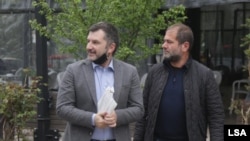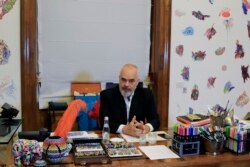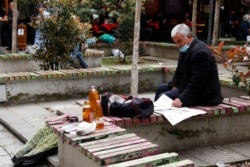First came the news that the personal data of over 900,000 Albanians might be in the hands of party officials. Then came the news that the journalists who broke the story had been ordered by an anti-corruption court to hand over devices, including computers and cellphones.
As Albania heads to national polls Sunday, with the ruling Socialist Party seeking a third term in office, the controversy over alleged misuse of personal data and the fact that an anti-corruption unit exerted pressure on Lapsi.al, the news site that revealed the alleged breach, has sparked a debate over press freedom.
Lapsi.al broke the story of the apparent breach on April 11, saying it had secured a database from a source whom it did not identify. The database contained personal information from thousands of people in the capital, Tirana, that Lapsi said could have come only from a government agency.
The ruling party and Prime Minister Edi Rama have denied the allegations, with Rama saying the database does not belong to the Socialist Party.
A week after Lapsi.al broke the story, police arrived at its Tirana offices with an order to seize equipment. The outlet's journalists refused.
Political motive alleged
The court order was part of an investigation into the alleged data breach, but media rights groups have criticized Albania's anti-corruption prosecutor unit, saying the order was politically motivated and counter to principles of free speech.
Arben Kraja, chair of the Special Prosecution Against Corruption and Organized Crime (SPAK), which requested the April 18 order, denied it was politically motivated. Kraja told VOA Albanian that the SPAK would also respect a decision by the European Court of Human Rights (ECHR) to halt any further action until it could issue a ruling in the case.
Albania's law guarantees the confidentiality of journalist sources, but it makes an exception if the information is necessary to corroborate a crime.
The Albanian Helsinki Committee, a human rights organization, says it has submitted a request to the Albanian Parliament to change this clause because it contravenes the European Convention of Human Rights.
"[Albanian] legislation cannot overrule the limitations posed by the European Convention of Human Rights." Erida Skëndaj, executive director of the committee, told VOA's Albanian Service.
Skëndaj said the commission had cited a prior ECHR ruling "where the court unequivocally states that sources are vital for reporters, and without sources they cannot get to the facts, and without facts it cannot offer citizens matters of public interest."
Tradition of protecting sources
Respect for journalists' right to protect sources is common in most countries with a strong tradition of a free press.
Tom Rosenstiel, executive director of the Washington-based media nonprofit American Press Institute, said that the First Amendment acts as a shield for press freedom in the U.S. and that judges "are very reluctant to ask reporters for their sources."
"They really don't do it unless they have exhausted, and can prove that they've exhausted, every other means," Rosenstiel said. "On the rare occasions that it does happen, journalists usually will be absolute in their refusal to acquiesce, and then they will go to jail to protect their sources."
The editors and co-owners of Lapsi.al told VOA they viewed the SPAK order as a danger to free speech.
"They seem more preoccupied in finding the 'traitor' within the Socialist Party [the person who leaked the database] than those who have stolen the data of almost 1 million people," said Andi Bushati, one of its managing editors.
Bushati added that the bodies that made the request were set up as part of a judicial reform to combat corruption — an issue described as "pervasive in all branches of government" in Albania, according to a 2020 U.S. State Department report on human rights in the country.
Rosenstiel, of the American Press Institute, said an independent investigation might have been a better route in investigating whether a crime had taken place.
'Last place' to look
"The last place you would go, I think, would be to try and seize the technology of the news organization that brought the problem to light in the first place," Rosenstiel said. "You would think [the court] would be delighted that the news organization was helping them uncover corruption."
Kraja, of SPAK, denied that Lapsi.al had been asked to reveal its source. The prosecutor’s office requested the database at the center of the reporting and the device it was stored on.
The investigation is following multiple avenues, Kraja said, but he declined to give further details, saying he was bound by law not to divulge them.
Media watchdogs say pressuring journalists to reveal sources can have a chilling effect.
"Authorities in Albania must guarantee this fundamental right for journalists. Questioning reporters as part of a leak investigation puts them under unnecessary pressure," Attila Mong, Europe correspondent for the Committee to Protect Journalists, said in an email to VOA.
Press freedom is vulnerable in Albania, with reporters often targeted and threatened for their work. The country ranks 83rd out of 180 countries, where 1 is the most free, in an index published Tuesday by Reporters Without Borders.
This report originated in VOA's Albanian Service.






